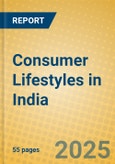The Consumer Lifestyles in India report analyses factors influencing national consumer expenditure. Consumer lifestyles reports include coverage of: population, urban development, home ownership, household profiles, labour, income, consumer and family expenditure, health, education, eating habits, drinking habits, shopping habits, personal grooming, clothing, leisure habits, savings and investments, media, communication, transport and travel and tourism. Use this report to understand the factors influencing a nation's lifestyle choices.
Data coverage: Market sizes (historic and forecasts), company shares, brand shares and distribution data.
Why buy this report?
- Get a detailed picture of the Consumer Overview market;
- Pinpoint growth sectors and identify factors driving change;
- Understand the competitive environment, the market’s major players and leading brands;
- Use five-year forecasts to assess how the market is predicted to develop.
Table of Contents
- Scope
- Consumer landscape in India 2025
- Personal traits and values
- Respondents feel concerned that the cost of everyday items are going up
- Consumers in India feel comfortable expressing their identity with friends and family
- Younger generations more likely to immerse themselves in online simulations
- Millennials say it is likely that they will experience an increase in financial wellbeing
- Personal traits and values survey highlights
- Home life and leisure time
- Younger generations use generative AI to assist with daily activities
- Consumers in India desire secure place to visit when travelling
- Home life and leisure time survey highlights
- Eating and dietary habits
- Consumers look for healthy ingredients in food and beverages
- Gen X says that food from restaurants tastes better
- Younger generations eat snacks while at work
- Baby Boomers closely read nutrition labels
- Consumers are ready to pay more for products with health and nutritional properties
- Eating and dietary habits survey highlights
- Working life
- Younger generations want to be comfortable in expressing their identity at work
- Consumers desire to have a job that enables an equilibrium between work and personal life
- Millennials seek to acquire effective career coaching
- Consumers expect to work from home in the future
- Working life survey highlights
- Health and wellness
- Respondents walk or hike for exercise
- Yoga remains popular among all Indian generational cohorts
- Indians consider health and nutritional properties to be the most influential product feature
- Millennials actively use apps to track health or fitness
- Health and wellness survey highlights
- Shopping and spending
- Consumers try to embrace a minimalist lifestyle
- Baby Boomers look for reputable or popular brands
- Gen X wants personalised and tailored shopping experiences
- Younger generations try to acquire goods and services that are sourced locally
- Consumers often share/swap items or services
- Millennials regularly follow or like companies' social media feeds or posts
- Millennials buy items online
- Consumers expect to increase spending on health and wellness the most
- Gen X consumers feel at ease with their present monetary state
- Shopping and spending survey highlights








